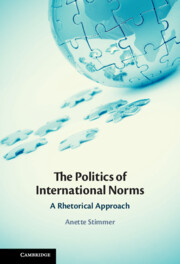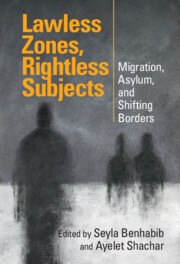673 results
Chapter 6 - Constructing Sovereignty through Legal and Religious Discourses
- from Part I - Concepts
-
-
- Book:
- The Cambridge Companion to Nineteenth-Century American Literature and Politics
- Published online:
- 06 March 2025
- Print publication:
- 13 March 2025, pp 107-124
-
- Chapter
- Export citation
Chapter 12 - Territoriality: The Possessive Logics of American Placemaking
- from Part II - Issues
-
-
- Book:
- The Cambridge Companion to Nineteenth-Century American Literature and Politics
- Published online:
- 06 March 2025
- Print publication:
- 13 March 2025, pp 205-220
-
- Chapter
- Export citation
Illicit trafficking in cultural property as a human rights issue: Sovereignty over cultural resources and the right to self-determination. Case study of Iraq
-
- Journal:
- International Journal of Cultural Property , First View
- Published online by Cambridge University Press:
- 27 February 2025, pp. 1-27
-
- Article
-
- You have access
- Open access
- HTML
- Export citation
4 - Norm Neglect
-
- Book:
- The Politics of International Norms
- Published online:
- 07 February 2025
- Print publication:
- 20 February 2025, pp 156-208
-
- Chapter
- Export citation

The Politics of International Norms
- A Rhetorical Approach
-
- Published online:
- 07 February 2025
- Print publication:
- 20 February 2025
1 - The Ideal of Liberty as Independence
- from Part I - Liberty and the Revolution of 1688
-
- Book:
- Liberty as Independence
- Published online:
- 23 January 2025
- Print publication:
- 06 February 2025, pp 13-43
-
- Chapter
- Export citation
9 - The Rise of the Mass
- from III - 1885–1931: The Crises of Liberalism
-
- Book:
- Modern Britain, 1750 to the Present
- Published online:
- 14 January 2025
- Print publication:
- 30 January 2025, pp 305-348
-
- Chapter
- Export citation
Indigenous political theory, metaphysical revolt, and the decolonial rearticulation of political ordering
-
- Journal:
- International Theory / Volume 17 / Issue 1 / March 2025
- Published online by Cambridge University Press:
- 27 January 2025, pp. 92-117
-
- Article
-
- You have access
- Open access
- HTML
- Export citation
Introduction
-
- Book:
- Constructing Modern Slavery
- Published online:
- 09 January 2025
- Print publication:
- 23 January 2025, pp 1-12
-
- Chapter
-
- You have access
- Open access
- HTML
- Export citation
Climate Migration and the Right to Exclude
-
- Journal:
- Ethics & International Affairs / Volume 38 / Issue 3 / Fall 2024
- Published online by Cambridge University Press:
- 23 January 2025, pp. 369-394
-
- Article
-
- You have access
- HTML
- Export citation
6 - Global Britain and the Modern Slavery Act 2015
-
- Book:
- Constructing Modern Slavery
- Published online:
- 09 January 2025
- Print publication:
- 23 January 2025, pp 164-202
-
- Chapter
-
- You have access
- Open access
- HTML
- Export citation
2 - Systems of Government and Distribution of Powers
-
- Book:
- Constitution-Building After the Arab Spring
- Published online:
- 31 December 2024
- Print publication:
- 09 January 2025, pp 63-139
-
- Chapter
- Export citation
2 - Unresolved Jurisdictional Issues in Law Enforcement Access to Data
- from Part I - Collecting Digital Evidence
-
-
- Book:
- The Cambridge Handbook of Digital Evidence in Criminal Investigations
- Published online:
- 02 January 2025
- Print publication:
- 09 January 2025, pp 43-67
-
- Chapter
- Export citation
Introduction
-
-
- Book:
- Lawless Zones, Rightless Subjects
- Published online:
- 02 January 2025
- Print publication:
- 09 January 2025, pp 1-26
-
- Chapter
-
- You have access
- Open access
- HTML
- Export citation
11 - Private Borders, Hidden Territories
- from Part III - Public Territories and Private Borders: Tracing Transnational Power Relations
-
-
- Book:
- Lawless Zones, Rightless Subjects
- Published online:
- 02 January 2025
- Print publication:
- 09 January 2025, pp 192-207
-
- Chapter
-
- You have access
- Open access
- HTML
- Export citation
14 - Three Responses to Shifting Borders
- from Part IV - Democratizing Shifting Borders
-
-
- Book:
- Lawless Zones, Rightless Subjects
- Published online:
- 02 January 2025
- Print publication:
- 09 January 2025, pp 247-263
-
- Chapter
-
- You have access
- Open access
- HTML
- Export citation
8 - Territoriality from the Sea
- from Part II - New Geographies of Borders: Territory, Land, and Water
-
-
- Book:
- Lawless Zones, Rightless Subjects
- Published online:
- 02 January 2025
- Print publication:
- 09 January 2025, pp 141-157
-
- Chapter
-
- You have access
- Open access
- HTML
- Export citation

Lawless Zones, Rightless Subjects
- Migration, Asylum, and Shifting Borders
-
- Published online:
- 02 January 2025
- Print publication:
- 09 January 2025
-
- Book
-
- You have access
- Open access
- Export citation
1 - Introduction
-
-
- Book:
- Digital Sovereignty in the BRICS Countries
- Published online:
- 31 December 2024
- Print publication:
- 02 January 2025, pp 1-38
-
- Chapter
-
- You have access
- Open access
- HTML
- Export citation
5 - Belligerent Reprisals in Non-international Armed Conflict
-
- Book:
- Belligerent Reprisals from Enforcement to Reciprocity
- Published online:
- 12 December 2024
- Print publication:
- 19 December 2024, pp 191-221
-
- Chapter
- Export citation

